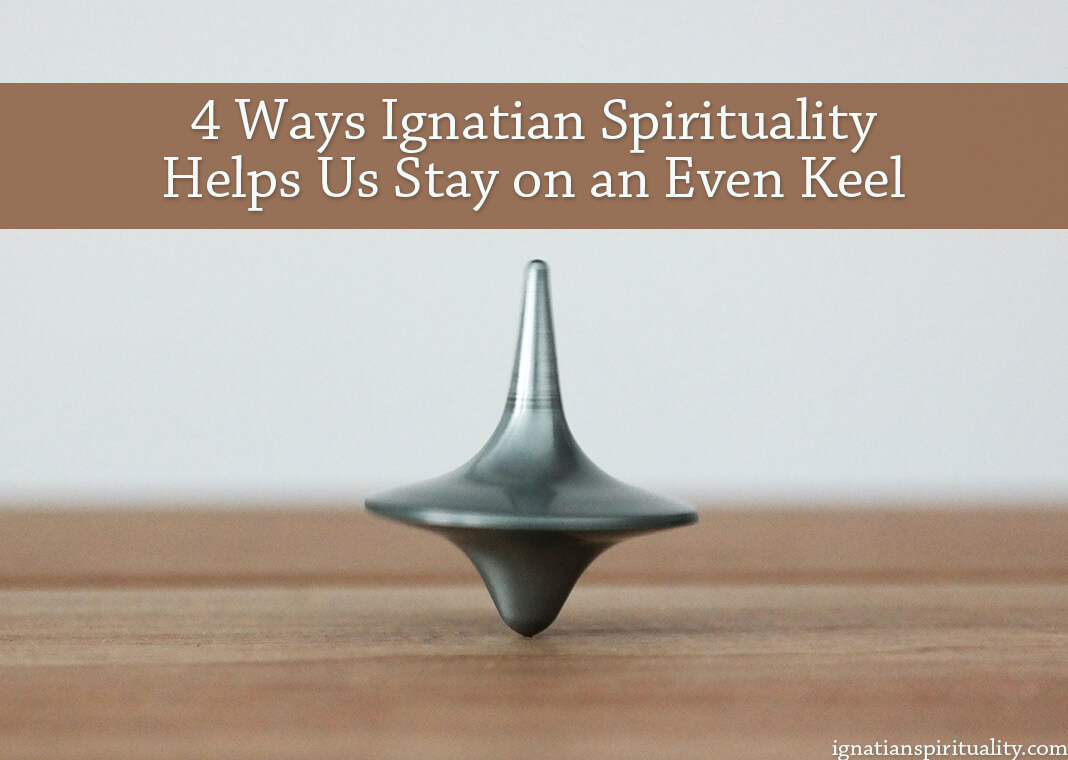
We live in unsettling times; war, disease, political conflict, and even turbulent weather can feel disquieting. How can we stay on an even keel in the midst of it all?
Ignatian spirituality is one of realism, and in that sense, it does not ask that we escape into a fantasy land of “everything will be just fine.” But we have many models among both early and modern-day Jesuits and their companions of being active in the midst of difficulties. Peter Claver, SJ, ministered to people who were enslaved in the coastal town of Cartagena, tending to their wounds and speaking to them about spiritual matters. Daniel Berrigan, SJ, was involved in anti-nuclear and war protests. At many Jesuit colleges and universities, students serve in nearby urban areas and encounter educational deficits, hunger, poverty, and homelessness.
To a degree, it is healthy and right to feel heartbroken or angry about the social problems that we encounter. Spirituality ought to inform a desire to create a world more like the one that God envisions for us. Along the way, we are bound to experience a whole range of emotions: satisfaction, frustration, happiness, sadness, anger, or joy.
At the same time, it is vital for each of us to care well for ourselves and to find a way to stay on an even keel—at least most of the time. What are some of the resources that Ignatian spirituality offers for how to do this when encountering social problems?
- St. Ignatius counsels that we store up consolations for times of desolation. Although he intends this primarily in reference to spiritual experiences, I think it can also be broadened to include the need to take time for experiences that are likely to produce consolation. For example, I find it greatly consoling to walk in places with many trees, flowers, and birds. My husband and I like to bird-watch, and taking the time to do so brings me joy. When I read the news, I am still moved by what I read about, but that store of consolation helps me to feel more grounded and able to respond in more helpful and healthier ways.
- The Principle and Foundation reminds us that it’s not about money, honor, or career success. When we give to others in our community, even where there is suffering, the joy of human connection and love is there, waiting to be found.
- Ignatius counsels that when we are in a time of desolation, it is good to “act against” and to resist rather than to collapse into the desolation. Today, that might mean after learning of an especially difficult news story, we turn off the television or disengage from social media and act in a way that moves the world closer to the good, rather than “doomscrolling.”
- Ignatius recognized that no one individual could do it all; he therefore attended to the different gifts that his fellow Jesuits possessed. Likewise, we need to remember that we do not have to “do it all.” I can choose to put energy towards pro-environmental issues or spend time visiting men in prison, and know that there are other people who are giving in other ways. We need to be generous but also understand our own limits through discerning the best way to use our energy and time.
Does all this protect us from the difficulties of the world or act as a shelter from heartbreak and desolation? No, and neither ought it to do so. It’s human for us to respond to both social and personal problems with real emotion. However, we can also take good advice from the tradition of Ignatian spirituality to find more balance in how we respond to the larger problems that face our world. Prayer and community sustain us, as God invites us to act with discerning and generous hearts, grounded in the knowledge of God’s love and hope for us.
Photo by Christophe Hautier on Unsplash.

Marina, it seems that you are speaking directly to me. For sometime now, I have been feeling like that person described in you blog above. My self talk has been on spot with your teaching and have discerned frequently the St. Ignatius process above. I have been struggling with staying focus and practice the Ignatian teachings..
I do feel God’s & the Holy Spirits presence always but find it difficult with all that goes on in our spiritual, every day lives to not give in to our worldly issues and to those who are suffering and less fortunate to ourselves.
My new warfare tactics invisions myself walking with the Lord and Virgin Mother hand in hand and envisioning we are walking towards heaven to eternal life to live in peace and love forever. Thank you for the reminders. Blessings!
Dear Marina, I’ve just read your book The Ignatian Guide to Forgiveness: Ten Steps to Healing. Just wanted to say a big thank you.
Thanks Marina. Ignatian spirituality is a healthy process. Being active in the midst of difficulties is a natural outcome of such a process. Saint Ignatius of Loyola – Pray for us.
Perfect solution for everything in life
Nice. Encouraging.
Very true and gives much to think about. Especially if one is aged,can’t get to Mass, in aged care and is in Lock Down. Thank you and God Bless. A.M.D.G.
Beautifully said and very appropriate to our world today. Thank you.